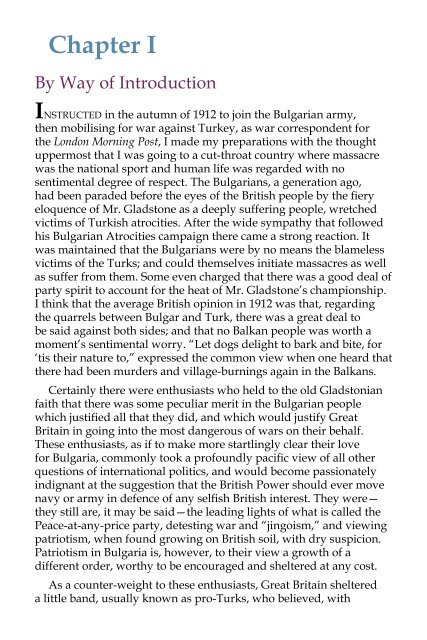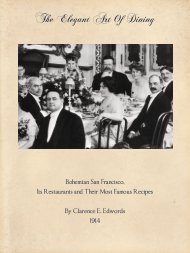Bulgaria e-book - iMedia
Bulgaria e-book - iMedia
Bulgaria e-book - iMedia
Create successful ePaper yourself
Turn your PDF publications into a flip-book with our unique Google optimized e-Paper software.
Chapter I<br />
By Way of Introduction<br />
Instructed in the autumn of 1912 to join the <strong>Bulgaria</strong>n army,<br />
then mobilising for war against Turkey, as war correspondent for<br />
the London Morning Post, I made my preparations with the thought<br />
uppermost that I was going to a cut-throat country where massacre<br />
was the national sport and human life was regarded with no<br />
sentimental degree of respect. The <strong>Bulgaria</strong>ns, a generation ago,<br />
had been paraded before the eyes of the British people by the fiery<br />
eloquence of Mr. Gladstone as a deeply suffering people, wretched<br />
victims of Turkish atrocities. After the wide sympathy that followed<br />
his <strong>Bulgaria</strong>n Atrocities campaign there came a strong reaction. It<br />
was maintained that the <strong>Bulgaria</strong>ns were by no means the blameless<br />
victims of the Turks; and could themselves initiate massacres as well<br />
as suffer from them. Some even charged that there was a good deal of<br />
party spirit to account for the heat of Mr. Gladstone’s championship.<br />
I think that the average British opinion in 1912 was that, regarding<br />
the quarrels between Bulgar and Turk, there was a great deal to<br />
be said against both sides; and that no Balkan people was worth a<br />
moment’s sentimental worry. “Let dogs delight to bark and bite, for<br />
‘tis their nature to,” expressed the common view when one heard that<br />
there had been murders and village-burnings again in the Balkans.<br />
Certainly there were enthusiasts who held to the old Gladstonian<br />
faith that there was some peculiar merit in the <strong>Bulgaria</strong>n people<br />
which justified all that they did, and which would justify Great<br />
Britain in going into the most dangerous of wars on their behalf.<br />
These enthusiasts, as if to make more startlingly clear their love<br />
for <strong>Bulgaria</strong>, commonly took a profoundly pacific view of all other<br />
questions of international politics, and would become passionately<br />
indignant at the suggestion that the British Power should ever move<br />
navy or army in defence of any selfish British interest. They were—<br />
they still are, it may be said—the leading lights of what is called the<br />
Peace-at-any-price party, detesting war and “jingoism,” and viewing<br />
patriotism, when found growing on British soil, with dry suspicion.<br />
Patriotism in <strong>Bulgaria</strong> is, however, to their view a growth of a<br />
different order, worthy to be encouraged and sheltered at any cost.<br />
As a counter-weight to these enthusiasts, Great Britain sheltered<br />
a little band, usually known as pro-Turks, who believed, with<br />
almost as passionate a sincerity as that of the pro-<strong>Bulgaria</strong>ns, that<br />
the Turk was the only gentleman in Europe, and that his mild and<br />
blameless aspirations towards setting up the perfect State were<br />
being cruelly thwarted by the abominable Bulgars and other Balkan<br />
riff-raff. Good government in the Balkans would come, they held,<br />
if the tide of Turkish rule flowed forward and the restless, semisavage,<br />
murderous Balkan Christian states went back to peace and<br />
philosophic calm under the wise rule of Cadi administering the will<br />
of the Khalifate.<br />
But pro-<strong>Bulgaria</strong>n and pro-Turk made comparatively few converts<br />
in Great Britain. They formed influential little groups and inspired<br />
debates in the House of Lords and the House of Commons, and<br />
published literature, and went out as missions to their beloved<br />
nationalities, and had all their affection confirmed again by the<br />
fine appreciation showered upon them. The great mass of British<br />
public opinion, however, they did not touch. There was never a<br />
second flaming campaign because of Turkish atrocities towards<br />
<strong>Bulgaria</strong>, and the pro-Turks never had a sufficient sense of humour<br />
to suggest a counter-campaign when <strong>Bulgaria</strong>ns made reprisals. In<br />
official circles the general attitude towards Balkan affairs was one of<br />
vexation alternating with indifference.<br />
“Those detestable Balkans!” quoth one diplomat in an<br />
undiplomatic moment: and expressed well the official mind. “They<br />
are six of one and half a dozen of the other,” said the man in the<br />
street when he heard of massacres, village-burnings, and tortures<br />
in the Balkans; and he turned to the football news with undisturbed<br />
mind, seeking something on which a fair opinion could be formed<br />
without too much worry.<br />
The view of the man in the street was my view in 1912. I can recall<br />
being contented in my mind to know that at any rate one’s work as<br />
a war correspondent would not be disturbed by any sympathy for<br />
the one side or the other. Whichever side lost it would deserve to<br />
have lost, and whatever reduction in the population of the Balkan<br />
Peninsula was caused by the war would be ultimately a benefit<br />
to Europe. In parts of America where the race feeling is strongest,<br />
they say that the only good nigger is a dead nigger. So I felt about<br />
the Balkan populations. The feelings of a man with some interest<br />
in flocks of sheep on hearing that war had broken out between the<br />
wolves and the jackals would represent fairly well the attitude of<br />
mind in which I packed my kit for the Balkans.





